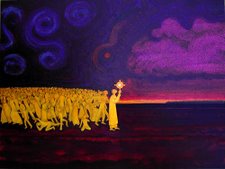
Brilliant report by JohnAllenJr.:
By John L Allen Jr Daily
Created Nov 30 2007 - 07:44
By JOHN L. ALLEN JR.
New York
If one were to compile a list of the core concerns of Joseph Ratzinger, his idees fixes over almost sixty years now of theological reflection, it might look something like this:
• Truth is not a limit upon freedom, but the condition of freedom reaching its true potential;
• Reason and faith need one another – faith without reason becomes extremism, while reason without faith leads to despair;
• The dangers of the modern myth of progress, born in the new science of the 16th century and applied to politics through the French Revolution and Marxism;
• The impossibility of constructing a just social order without reference to God;
• The urgency of separating eschatology, the longing for a “new Heaven and a new earth,” from this-worldly politics;
• Objective truth as the only real limit to ideology and the blind will to power.
All those themes take center stage once again in the encyclical Spe Salvi, released today in Rome. In that sense, one could argue that the text represents a sort of “Greatest Hits” collection of Ratzinger’s most important ideas, developed over a lifetime, and now presented in the form of an encyclical in his role as Pope Benedict XVI.
Jesuit Fr. Federico Lombardi, the Vatican spokesperson, lent credence to this reading in a Rome news conference this morning, saying that in Spe Salvi “we see very clearly the hand and the style of the author,” describing the encyclical as “absolutely and personally” the pope’s own thought. (In fact, Lombardi said, papal advisers are working on the draft of another encyclical, this one on social themes, and were "surprised" that in the meantime Benedict produced an encyclical more or less entirely on his own.)
One should hasten to add, of course, that Benedict himself would not really see these as “his” ideas, but rather as foundational principles of 2,000 years of Christian teaching and tradition. Yet few figures over the last 60 years have articulated these points with the force, or the political and ecclesiastical consequence, of Joseph Ratzinger.
In essence, the message of Spe Salvi can be expressed this way: If human beings place their hopes for justice, redemption and a better life exclusively in this-worldly forces, whether it’s science, politics, or anything else, they’re lost. The carnage of the 20th century, the pope suggests, illustrates the folly of investing human ideology and technology with messianic expectations.
Instead, ultimate hope – what the pope describes as “the great hope” – lies only in God, because only through the moral and spiritual wisdom acquired through faith can technology and political structures be directed towards ends which are truly human.
As early as 1977, in his book Eschatologie: Tod und ewiges Leben (“Eschatology: Death and Eternal Life”), which Ratzinger once described as his “most thorough work,” the future pope argued that under the impact of Marx, mistaken notions of the Kingdom of God were threatening the integrity of the Christian message. When people confuse the gospel with a political message, he wrote, the distinctively Christian element is lost, “leaving behind nothing but a deceptive surrogate.”
In his 1987 book Church, Ecumenism and Politics, Ratzinger returned to the theme: “Where there is no dualism,” he wrote, meaning a strong distinction between eschatology and politics, “there is totalitarianism.”
The fear that politics could replace the Last Judgment and the afterlife as the focus of Christian hope was also perhaps Ratzinger’s deepest underlying objection to liberation theology, the movement in Latin America in the 1960s, 70s and 80s that sought to align the church with progressive efforts for social change.
Thus it is no surprise in Spe Salvi to see Benedict XVI drawing a sharp distinction between Jesus and social revolutionaries of his era such as Spartacus and Bar-Kochba, nor warning once more that Marx’s “fundamental error” of materialism led to “a trail of appalling destruction.”
The necessary link between reason and faith is also a favorite preoccupation of the pope; it was the heart, for example, of his now-famous lecture at the University of Regensburg in Bavaria on Sept. 12, 2006, that touched off protest in the Islamic world because of Benedict’s citation of a 14th century Byzantine emperor concerning Muhammad.
“Reason needs faith if it is to be completely itself,” Benedict writes in Spe Salvi. “Reason and faith need one another in order to fulfill their true nature and their mission.”
Throughout the 19,000-word encyclical, there are several other vintage Ratzinger touches.
For example, Ratzinger has long pressed the need to re-present basic concepts of the faith to a modern world he regards as jaded by a sort of weary familiarity with Christianity. Thus in Spe Salvi, we find him writing: “We who have always lived with the Christian concept of God, and have grown accustomed to it, have almost ceased to notice that we possess the hope that ensues from a real encounter with this God.”
Likewise, both as a personal theologian and as pope, Benedict has long said that he has no objection to the theory of evolution as such, but is alarmed by a radically materialistic philosophy that would see human beings as exclusively the random product of an evolutionary process.
“It is not the law of matter and of evolution that have the final say,” he writes in the new encyclical, "but reason, will, love – a Person … Life is not a simple product of laws and the randomness of matter, but within everything and at the same time above everything, there is a Spirit who in Jesus has revealed himself as Love.”
Many observers have noted that sometimes Benedict the Supreme Pastor and Joseph Ratzinger the exacting theologian sit in uneasy tension with one another, and those contrasting elements of his personality are clearly visible once again in Spe Salvi.
At times, Benedict can be almost poetic, as in this passage attempting to express the notion of eternal life: “It would be like plunging into the ocean of infinite love,” he writes, “a moment in which time – the before and after – no longer exists.”
In other passages, however, Spe Salvi can read like an essay one might find in a journal of theology of Biblical studies. Benedict critiques an ecumenical translation of the New Testament, for example, one approved by the German Catholic bishops, for offering what he regards as an overly subjective reading of the Greek word hypostasis. The pope prefers the term "substance" arguing that what's meant is not an inner conviction about the faith but rather its objective foundation. Benedict also spends considerable time reflecting on two pairs of Greek terms: hypostasis/hyparchonta and hypomone/hypostole.
Benedict can also be surprisingly ecumenical in his erudition; to correct the translation mentioned above, the pope cites approvingly the work of a liberal German Protestant exegete, Helmut Köster. (Köster, by the way, was a student of Rudolf Bultmann, the liberal exegete who developed the idea of “demythologizing” the Bible, and a longtime bête noire of Ratzinger’s.)
Benedict is, by his own admission, a convinced Augustinian, and no one could miss that in Spe Salvi: Augustine is cited no fewer than 13 times, often at some length.
Finally, Benedict the intellectual is also a man deeply respectful of pious popular tradition, and this too shines through Spe Salvi. For example, towards the end of the encyclical, Benedict recommends a return to the custom of “offering up” one’s small daily sufferings in prayer to God, writing that even if there were “exaggerations and perhaps unhealthy applications” of the idea, it still offers Christians a way to insert small inconveniences “into Christ’s great compassion.”
Benedict XVI is a classic music lover who, at age 80, still enjoys passing time at a piano keyboard. To evoke another musical metaphor, Spe Salvi amounts to Ratzingerian “variations on a theme,” reworking and refining key leitmotifs of his thought. The question is whether the new score in Spe Salvi will also catch the ears of those who, to date, have not yet started humming the tune.


















